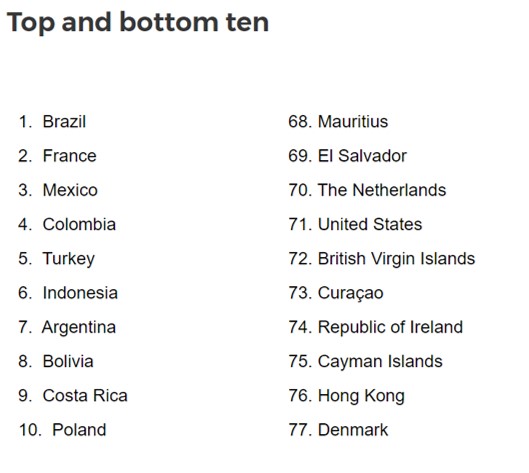Surveys
Brazil, France Score Badly For Ease Of Doing Business; Hong Kong, Denmark Shine

Ease of doing business is often one of the main ways of knowing whether a country, large or small, is going to attract inward investment and talent. By that yardstick, countries such as Brazil and France have to make reforms.
France is second only to Brazil as being the most complex
jurisdiction in which to do business, while Denmark is the most
straightforward, followed by Hong Kong, according to the
professional services firm TMF Group's Global
Business Complexity Index (GBCI).
The study analyses rules, regulations, tax rates, penalties and
compliance requirements across 77 jurisdictions, which account
for 92 per cent of the world's total GDP and 95 per cent of net
global foreign direct investment flows. In total, 292 indicators
are tracked annually, offering data on aspects of doing business,
including how fast a firm is incorporated, payroll and benefits
requirements, and compliance procedures.

Discussing specific results, TMG said that France's second place
is “driven by complexities in accounting and tax processes, its
heavily employee-centric HR regulations, and local language
requirements for accounts reporting.”
“Despite the introduction of "Business France" – a website to
assist foreign companies to remain compliant with French
accounting standards – businesses may still struggle due to the
constant changes to those standards. HR and payroll is also
heavily regulated, and employment litigation outcomes are usually
in favour of employees. Firing an underperforming worker can take
up to 12 weeks, as opposed to one week in Ireland, for instance,”
TMG Group said.
Staying with Europe, TMF noted that Poland, which was ranked 34th
most complex country in 2020, is now the 10th least
business-friendly country in which to operate globally.
“Reasons can be found in an always evolving legislative scenario,
which leaves business little time to react and implement changes
in accordance with new laws. In addition, despite the government
having adopted electronic signatures, Polish authorities don't
accept many international signature providers, and instead
require signatures from specific local providers, adding to
complexity in the jurisdiction,” it continued.